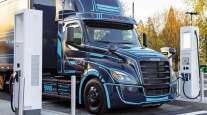Senior Reporter
Sustainable Supply Chains Grow More Important

[Stay on top of transportation news: Get TTNews in your inbox.]
A growing number of corporations have sustainability goals, according to a new study by Coyote Logistics, and are looking for the supply chain to amplify those efforts.
“Sustainable Supply Chain Management: Driving a Smarter, More Sustainable Future” found 81% of companies are more focused on sustainability today compared with three years ago, and to be successful their supply chains must play an integral role in owning sustainable initiatives across their networks.
It was conducted in partnership with market research firm Martec.
Driven by consumer preference, cost-savings, and brand reputation, companies rank environmental #sustainability high, regardless of company size or industry served, according to a study from 3PL @CoyoteLogistics. https://t.co/QTFq56yCDQ #supplychain #green — SupplyChainQuarterly (@TheQuarterly) October 1, 2020
The study included 250 global shippers across various industries, company sizes, verticals and seniority levels to explore buying habits and perceptions about the evolution toward a more sustainable supply chain.
“Currently, 70% of companies take sustainability into consideration on their RFPs, but only 25% currently have it as a requirement. As supply chain sustainability becomes increasing prevalent, that will change,” according to the report.
While other powertrain options are emerging and being piloted, diesel remains king in trucking.
Since 2010, U.S. retail sales of Class 8 vehicles that are increasingly cleaner and more fuel efficient (compared with previous model years) total 2.1 million, according to WardsAuto.com.

“Given the massive up-front price premium of zero-emissions vehicles, the availability of significant government subsidies and financing will be essential factors in the rate of ZEV adoption,” Dan Clark, head of BMO Transportation Finance, told Transport Topics. “I am not aware of any specific finance programs from either captives or noncaptives [lenders] but as a company we have seen medium-duty opportunities for financing.”
Clark said the immaturity of the ZEV market made forecasting residual values difficult as the used ZEV market will be extremely shallow until the first trade-in cycle, “which, at best, will be toward the end of the decade, but more realistically after 2030.”
Also, consumer loyalty based on sustainable efforts was clearly demonstrated in the study as 61% of respondents noted their willingness to wait longer for the delivery of their purchases if they know it’s better for the environment. Despite this, same-day and next-day delivery options are commonplace.
“Delivering on both requires a holistic, collaborative effort from all members of the supply chain,” said Mike Sinkovitz, senior vice president of Coyote Transportation Management.
Meanwhile, a growing list of suppliers of near- and zero-emission technology is aiding trucking’s role in corporate sustainability, said Luke Tonachel, director of the clean energy and fuels group at NRDC.
Calstart, a Pasadena, Calif.-based clean transportation accelerator, has been keeping a list of those suppliers, he said, through its Drive to Zero program — which anticipates ZE technology will be commercially viable by 2025 and dominate by 2040 in specific vehicle segments in the United States led by California, China, the European Union, India, Canada, Japan, Mexico and South America.
“Policies like clean vehicle standards set a level playing field for competition and promote innovation by manufacturers,” Tonachel said. “Corporations see viable [trucks] coming to market to fulfill their sustainability goals and set commitments that reinforce the market signal to manufacturers.”

What are industry executives doing to help bring more women into the fold, not only as drivers, but in leadership roles? Host Michael Freeze talks with Ellen Voie of Women In Trucking and Debora Babin Katz of TrucBrush Corp. Hear a snippet, above, and get the full program by going to RoadSigns.TTNews.com.
At the same time,“We have seen significant growth in at least companies making more goals about what they want to do to reduce social and environmental impact, too,” said Alexis Bateman, director of sustainable supply chain at MIT Center for Transportation & Logistics.
“When you get into the next step about how they are achieving it and reporting it, the results get a little murkier,” she told TT.
She said the center is looking into a new approach to using carbon offsets that have traditionally involved, for instance, planting trees. The new concept is called carbon insets — or reinvesting carbon offset money into newer technologies for the trucking industry to scale efforts that reduce overall impact.
“There’s no real standard up to this point,” Bateman said. “I think that is why there is a lot of vying right now on how it is going to run, but in some cases there would be a third party that would help manage that.”
Want more news? Listen to today's daily briefing:
Subscribe: Apple Podcasts | Spotify | Amazon Alexa | Google Assistant | More




